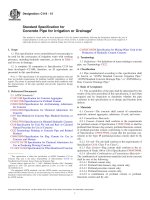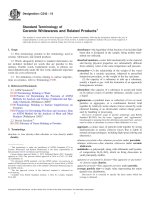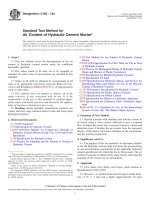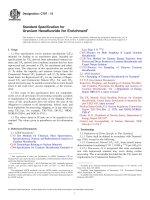Astm c 118 15
Bạn đang xem bản rút gọn của tài liệu. Xem và tải ngay bản đầy đủ của tài liệu tại đây (90.85 KB, 4 trang )
Designation: C118 − 15
Standard Specification for
Concrete Pipe for Irrigation or Drainage1
This standard is issued under the fixed designation C118; the number immediately following the designation indicates the year of
original adoption or, in the case of revision, the year of last revision. A number in parentheses indicates the year of last reapproval. A
superscript epsilon (´) indicates an editorial change since the last revision or reapproval.
1. Scope
C1602/C1602M Specification for Mixing Water Used in the
Production of Hydraulic Cement Concrete
1.1 This specification covers nonreinforced concrete pipe to
be used for the conveyance of irrigation water with working
pressures, including hydraulic transients, as shown in Table 1
and for use in drainage.
3. Terminology
3.1 Definitions—For definitions of terms relating to concrete
pipe, see Terminology C822.
1.2 A complete SI companion to Specification C118 has
been developed—C118M; therefore, no SI equivalents are
presented in this specification.
4. Classification
4.1 Pipe manufactured according to this specification shall
be known as “ASTM Standard Concrete Irrigation Pipe,”
“ASTM Standard Concrete Drainage Pipe,” or “ASTM HeavyDuty Concrete Drainage Pipe.”
NOTE 1—This specification is for manufacturing and purchase only and
does not include requirements for bedding, backfill, installation, or field
repairs. The owner is cautioned that he must correlate field conditions with
the characteristics of the pipe specified and provide inspection during
installation.
5. Basis of Acceptance
5.1 The acceptability of the pipe shall be determined by the
results of the tests prescribed in this specification, if and when
required and by inspection to determine whether the pipe
conforms to this specification as to design and freedom from
defects.
2. Referenced Documents
2
2.1 ASTM Standards:
C33/C33M Specification for Concrete Aggregates
C150/C150M Specification for Portland Cement
C260/C260M Specification for Air-Entraining Admixtures
for Concrete
C494/C494M Specification for Chemical Admixtures for
Concrete
C497 Test Methods for Concrete Pipe, Manhole Sections, or
Tile
C595/C595M Specification for Blended Hydraulic Cements
C618 Specification for Coal Fly Ash and Raw or Calcined
Natural Pozzolan for Use in Concrete
C822 Terminology Relating to Concrete Pipe and Related
Products
C989/C989M Specification for Slag Cement for Use in
Concrete and Mortars
C1017/C1017M Specification for Chemical Admixtures for
Use in Producing Flowing Concrete
C1116/C1116M Specification for Fiber-Reinforced Concrete
6. Materials
6.1 Concrete—The concrete shall consist of cementitious
materials, mineral aggregates, admixture, if used, and water.
6.2 Cementitious Materials:
6.2.1 Cement—Cement shall conform to the requirements
for portland cement of Specification C150/C150M or shall be
portland blast-furnace slag cement, portland-limestone cement,
or portland-pozzolan cement conforming to the requirements
of Specification C595/C595M, except that the pozzolan constituent in the Type IP portland-pozzolan cement shall be fly
ash.
6.2.2 Fly Ash—Fly ash shall conform to the requirements of
Specification C618, Class F or Class C.
6.2.3 Slag Cement—Slag cement shall conform to the requirements of Grade 100 or 120 of Specification C989/C989M.
6.2.4 Allowable Combinations of Cementitious Materials—
The combination of cementitious materials used in the concrete
shall be one of the following:
6.2.4.1 Portland cement only;
6.2.4.2 Portland blast-furnace slag cement only;
6.2.4.3 Portland-pozzolan cement only;
6.2.4.4 Portland-limestone cement only;
6.2.4.5 A combination of portland cement or portlandlimestone cement and fly ash;
1
This specification is under the jurisdiction of ASTM Committee C13 on
Concrete Pipe and is the direct responsibility of Subcommittee C13.01 on
Non-Reinforced Concrete Sewer, Drain and Irrigation Pipe.
Current edition approved Oct. 1, 2015. Published October 2015. Originally
approved in 1935. Last previous edition approved in 2011 as C118 – 11. DOI:
10.1520/C0118-15.
2
For referenced ASTM standards, visit the ASTM website, www.astm.org, or
contact ASTM Customer Service at For Annual Book of ASTM
Standards volume information, refer to the standard’s Document Summary page on
the ASTM website.
Copyright © ASTM International, 100 Barr Harbor Drive, PO Box C700, West Conshohocken, PA 19428-2959. United States
1
C118 − 15
TABLE 1 Standard Dimensions, Working Pressure, and Test
Requirements for Standard Concrete Irrigation PipeA
Internal
Designated
Diameter, in.
Thickness
of Wall,
T, in.
Working
Pressure,B
ft
6
8
10
12
14
15
16
18
20
21
24
⁄
1
11⁄8
11⁄4
13⁄8
11⁄2
11⁄2
13⁄4
2
21⁄8
21⁄4
30
30
30
25
25
25
25
25
25
25
25
78
TABLE 2 Physical Test Requirements for Standard and HeavyDuty Concrete Drainage PipeA
Minimum
Minimum
Internal
Three-Edge-Bearing
Hydrostatic
Load, lbf/linear ft
Test Pressure,
psi
50
50
50
45
45
45
45
45
40
40
40
Standard Drainage Pipe
Heavy-Duty Drainage Pipe
Internal
Minimum
Minimum
Thickness
Designated Diameter, Thickness
Three-EdgeThree-Edgeof Wall,
of Wall,
in.
Bearing Load, lbf/
Bearing Load,
in.
in.
linear ft
lbf/linear ft
1300
1350
1400
1500
1600
1650
1700
1800
1850
1900
2000
4
5
6
8
10
12
14
15
16
18
20
21
24
A
For hydrostatic test requirements, refer to 10.5.
Higher working pressures are not prohibited up to a maximum of 40 ft for 6
through 8-in. diameters, 35 ft for 10 through 12-in. diameters, and 30 ft for 14-in.
through 24-in. diameters. In these cases, the strength of the pipe shall be
increased to give a minimum of at least four times the design working pressure
when tested as specified in 10.5.
B
6.2.4.6
limestone
6.2.4.7
limestone
6.2.4.8
ash.
⁄
⁄
7 ⁄8
1
1 1⁄ 8
1 1⁄ 4
1 3⁄ 8
1 1⁄ 2
1 1⁄ 2
1 3⁄ 4
2
2 1⁄ 8
2 1⁄ 4
34
34
1200
1250
1300
1350
1400
1500
1600
1650
1700
1800
1850
1900
2000
⁄
⁄
7 ⁄8
1
11⁄8
11⁄4
11⁄2
11⁄2
15⁄8
2
21⁄4
21⁄4
21⁄2
34
34
1400
1400
1400
1500
1550
1700
1850
1980
2100
2340
2500
2680
3000
A
For absorption test requirements, refer to 10.4.
7.2 Modified Design—Manufacturers shall submit to the
owner for approval prior to manufacture, wall thicknesses
other than those shown in Table 1 or Table 2. Such pipe shall
meet all of the test and performance requirements specified by
the owner in accordance with Section 10.
A combination of portland cement or portlandcement and slag cement;
A combination of portland cement or portlandcement, fly ash and slag cement; or
A combination of portland-pozzolan cement and fly
7.3 Laying Lengths—Unless otherwise specified by the
owner when calling for bids, maximum lengths of individual
units of drainage pipe shall not exceed 30 in. for sizes 4 in.
through 6 in., 36 in. for sizes 8 in. through 15 in., and 48 in. for
larger sizes.
6.3 Aggregates—Aggregates shall conform to the requirements of Specification C33/C33M, except that the requirements for gradation shall not apply.
8. Joints
6.4 Admixtures—The following admixtures and blends are
allowable:
6.4.1 Air-entraining admixture conforming to Specification
C260/C260M.
6.4.2 Chemical admixture conforming to Specification
C494/C494M;
6.4.3 Chemical admixture for use in producing flowing
concrete conforming to Specification C1017/C1017M; and
6.4.4 Chemical admixture or blend approved by the owner.
8.1 The joints of both irrigation and drainage pipe shall be
of such design and the ends of the concrete pipe sections so
formed that the pipe can be laid together to make a continuous
line of pipe compatible with the permissible variations given in
Section 11.
8.1.1 The joints of concrete drain tile shall conform to 8.1
without the use of mortar or other jointing material and allow
water to enter without permitting the entrance of deleterious
amounts of solids.
6.5 Fibers—Synthetic fibers and nonsynthetic fibers shall be
allowed to be used, at the manufacturer’s option, in concrete
pipe as a nonstructural manufacturing material. Synthetic fibers
(Type II and Type III) and nonsynthetic fiber (Type 1) designed
and manufactured specifically for use in concrete and conforming to the requirements of Specification C1116/C1116M shall
be accepted.
9. Concrete Mixture
9.1 The aggregates shall be sized, graded, proportioned, and
thoroughly mixed with such proportions of cementitious materials and water as will produce a homogeneous concrete
mixture of such quality that the pipe will conform to the test
and design requirements of this specification.
6.6 Water—Water used in the production of concrete shall
be potable or nonpotable water that meets the requirements of
Specification C1602/C1602M.
10. Physical Requirements
7. Design
10.1 Test Specimens—Specimens for tests shall be full-size
pipe, which shall in every respect conform to the inspection
requirements prescribed in this specification.
7.1 Design Tables—Design requirements shall be in accordance with Table 1 for standard concrete irrigation pipe or with
the applicable part of Table 2 for concrete drainage pipe. Wall
thicknesses used shall be not less than the values shown, except
as affected by the tolerances herein specified and by the
provision for alternative design.
10.2 Number and Type of Tests Required:
10.2.1 The specimens to be tested shall be selected at
random by the owner at the place of manufacture, and shall be
tested in advance of shipment. The manufacturer shall furnish
specimens for purpose of tests, without charge, up to 0.5 % of
the number of pipe of each size included in the order, except
2
C118 − 15
10.5.2 The pipe shall not fail when, after completion of the
portion of the test described in 10.5.1, the pressure is increased
to the minimum hydrostatic pressure specified in Table 1.
that in no case shall less than two specimens be furnished, the
manufacturer bearing all expense of testing each pipe. Should
a larger number of specimens be tested upon demand of the
owner or manufacturer, then the cost of such additional test
specimens and the expense of testing shall be borne by the
party making such demand.
10.2.2 The owner shall specify the proportion of irrigation
pipe specimens that shall be subjected to the three-edgebearing load tests, and the proportion that shall be subjected to
the hydrostatic test.
10.2.3 All drainage pipe to be tested shall be subjected to
the three-edge-bearing load tests, and one half of the number of
pipe so tested shall be subjected to the Test Method A or Test
Method B absorption test in accordance with Test Methods
C497, or other absorption test approved by the owner.
10.6 Retests—Irrigation pipe shall be acceptable under the
load and hydrostatic test requirements when all test specimens
conform to the test requirements. Drainage pipe shall be
acceptable under the load and absorption test requirements
when all the test specimens conform to the test requirements.
Should any of the initial test specimens fail to meet the test
requirements, the manufacturer will be allowed a retest on two
additional specimens for each initial specimen that failed, and
the tested lot will be acceptable only if all retest specimens
meet the test requirements. In the event these retest specimens
do not fully conform to the test requirements, the entire lot
shall be rejected without further test. The manufacturer shall
bear all the expense of retesting.
10.3 External Load Test Requirements—The pipe, when
tested in accordance with Test Methods C497 shall sustain the
load prescribed in Table 1 or Table 2 for each respective size
and class of pipe.
10.3.1 It is not prohibited to fill depressions of exterior
surface irregularities with plaster of paris to equalize the
bearing surfaces. If mutually agreed upon between the manufacturer and owner, other types of bearings such as hard rubber
blocks or sand-filled high-pressure hose are acceptable. The
user of this specification is advised that sand or other loose fine
material may be spread along the length of the crown of the
pipe to equalize the upper bearing.
10.3.2 The load shall be applied continuously until the
strength specified in Table 1 or Table 2 is reached. The pipe
shall not be allowed to stand under load longer than is required
to apply the load and to observe and record it. The pipe shall
be surface-dry when tested. Tests shall not be made on frozen
pipe.
11. Permissible Variations
11.1 Internal Diameter—The internal diameter shall not be
less than the values shown in Table 1 and Table 2 by more than
3⁄16 in. for pipe 4, 5, or 6 in. in diameter, by more than 1⁄4 in. for
pipe from 8 to 18 in. in diameter, and by not more than 5⁄16 in.
for pipe over 18 in. in diameter.
11.2 Wall Thickness—The minimum wall thickness of the
pipe shall be not more than 5 %, or 1⁄16 in., whichever is
greater, less than the wall thickness specified in Table 1 or
Table 2 for the applicable class of pipe, or as specified in an
approved alternative design.
12. Workmanship and Finish
12.1 Pipe shall be substantially free of fractures and surface
roughness.
13. Repairs
10.4 Absorption Test—Test specimens shall be subjected to
the boiling absorption test in accordance with Test Methods
C497. For Test Method A, three test specimens shall be taken
from each pipe unit to be tested; one of the pieces shall be
taken from one end of the pipe, another piece from the opposite
end, and the third piece from near the center. For Test Method
A, each test specimen shall be free of visible cracks, shall have
a minimum area of not less than 20 in.2 as measured on one
surface. The average absorption of the three specimens shall be
considered to be the absorption for that pipe. The absorption of
concrete drainage pipe as determined by the boiling absorption
test shall not exceed 9 % for Test Method A or 8.5 % for Test
Method B.
13.1 Pipe repaired because of occasional imperfections in
manufacturing or accidental injury during handling will be
acceptable if, in the opinion of the owner, the repairs are sound
and properly finished and cured and the repaired pipe conforms
to the requirements of this specification.
14. Inspection
14.1 The quality of all materials and the finished pipe shall
be subject to inspection and approval by the owner.
15. Rejection
15.1 Individual pipe units shall be subject to rejection on
account of failure to conform to any of the specification
requirements or on account of any of the following:
15.1.1 Fractures or cracks passing through the wall except
for an end crack that does not exceed the depth of the joint, or
a fracture that at its deepest point does not exceed the depth of
the joint nor extend more than 10 % around the circumference
of the joint.
15.1.2 Defects that indicate mixing and molding, not in
compliance with 9.1.
15.1.3 The complete absence of distinct web-like markings
from the external surface of the pipe made by any process in
10.5 Hydrostatic Tests:
10.5.1 Irrigation pipe, when tested in accordance with the
hydrostatic test procedures of Test Methods C497, shall sustain
an internal hydrostatic pressure of 10 psi for 10 min without
excessive leakage through the wall of the pipe. Moisture
appearing on the surface of the pipe in the form of patches or
beads adhering to the surface shall not be considered as
excessive leakage. Slow-forming beads of water from pinholes
that result in minor dripping and slight pinhole spurts that will
not interfere with the use of the pipe in service will not be
cause for rejection.
3
C118 − 15
which the forms are removed immediately after the concrete
has been placed, which is indicative of a deficiency of water in
the concrete mix, unless all specimens submitted for test that
do not have such web-like markings shall have passed the
physical tests herein required.
17. Keywords
17.1 absorption; acceptance criteria; concrete; design;
drainage; hydrostatic; irrigation; joints; manufacture; nonreinforced; pipe; pressure; tests; three-edge bearing
16. Product Marking
16.1 The letter “H” shall be stamped with waterproof ink, or
other permanent manner, on all heavy-duty concrete drainage
pipe.
ASTM International takes no position respecting the validity of any patent rights asserted in connection with any item mentioned
in this standard. Users of this standard are expressly advised that determination of the validity of any such patent rights, and the risk
of infringement of such rights, are entirely their own responsibility.
This standard is subject to revision at any time by the responsible technical committee and must be reviewed every five years and
if not revised, either reapproved or withdrawn. Your comments are invited either for revision of this standard or for additional standards
and should be addressed to ASTM International Headquarters. Your comments will receive careful consideration at a meeting of the
responsible technical committee, which you may attend. If you feel that your comments have not received a fair hearing you should
make your views known to the ASTM Committee on Standards, at the address shown below.
This standard is copyrighted by ASTM International, 100 Barr Harbor Drive, PO Box C700, West Conshohocken, PA 19428-2959,
United States. Individual reprints (single or multiple copies) of this standard may be obtained by contacting ASTM at the above
address or at 610-832-9585 (phone), 610-832-9555 (fax), or (e-mail); or through the ASTM website
(www.astm.org). Permission rights to photocopy the standard may also be secured from the Copyright Clearance Center, 222
Rosewood Drive, Danvers, MA 01923, Tel: (978) 646-2600; />
4









